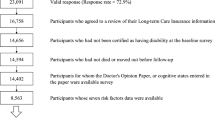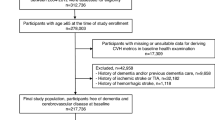Abstract
The epidemiological and societal burden of dementia is expected to increase in the coming decades due to the world population aging. In this context, the evaluation of the potential impact of intervention scenarios aiming at reducing the prevalence of dementia risk factors is an active area of research. However, such studies must account for the associated changes in mortality and the dependence between the risk factors. Using micro-simulations, this study aims to estimate the changes in dementia burden in France in 2040 according to intervention scenarios targeting the prevention or treatment of hypertension, diabetes and physical inactivity. Accounting for their communality and their effects on mortality, the results show that the disappearance of hypertension, diabetes and physical inactivity in France in 2020 could decrease dementia prevalence by 33% among men and 26% among women in 2040 and increase the life expectancy without dementia at age 65 by 3.4 years (men) and 2.6 years (women). Among the three factors, the prevention of hypertension would be the most efficient. These projections rely on current estimates of the risk of dementia and death associated with risk factors. Thanks to the R package developed they could be refined for different countries or different interventions and updated with new estimates.

Similar content being viewed by others
References
Patterson C. World Alzheimer report 2018. London: Alzheimer’s Disease International; 2018.
Alzheimer’s. Association report 2021 Alzheimer’s disease facts and figures. Alzheimer’s Dement. 2021;17:327–406.
World Health Organization. Risk Reduction of Cognitive Decline and Dementia: WHO guidelines. Geneva. ; 2019. Available at: https://www.who.int/mental_health/neurology/dementia/guidelines_risk_reduction/en/.
Livingston G, Huntley J, Sommerlad A, et al. Dementia prevention, intervention, and care: 2020 report of the Lancet Commission. Lancet. 2020;396(10248):413–46.
McGrath ER, Beiser AS, DeCarli C, et al. Blood pressure from mid- to late life and risk of incident dementia. Neurology. 2017;89:2447–54.
Norton S, Matthews FE, Barnes DE, et al. Potential for primary prevention of Alzheimer’s disease: an analysis of population-based data. Lancet Neurol. 2014;13:788–94.
Chatterjee S, Peters SA, Woodward M, et al. Type 2 diabetes as a risk factor for dementia in women compared with men: a pooled analysis of 2.3 million people comprising more than 100,000 cases of dementia. Diabetes Care. 2016;39:300–07.
Reinke C, Buchmann N, Fink A, et al. Diabetes duration and the risk of dementia: a cohort study based on german health claims data. Age Ageing. 2022;51(1):1–9. https://doi.org/10.1093/ageing/afab231.
Livingston G, Sommerlad A, Orgeta V, et al. Dementia prevention, intervention, and care. Lancet. 2017;390:2673–734.
Barnes DE, Yaffe K. The projected effect of risk factor reduction on alzheimer’s disease prevalence. Lancet Neurol. 2011;10(9):819–28.
Brookmeyer R, Johnson E, Ziegler-Graham K, Arrighi HM. Forecasting the global burden of Alzheimer’s disease. Alzheimers Dement. 2007;3(3):186–91.
Brookmeyer R, Abdalla N, Kawas CH, Corrada MM. Forecasting the prevalence of preclinical and clinical Alzheimer’s disease in the United States. Alzheimers Dement. 2018;14(2):121–9.
Wolters FJ, Tinga LM, Dhana K, et al. Life expectancy with and without dementia: a population-based study of dementia burden and preventive potential. Am J Epidemiol. 2019;188(2):372–81.
Joly P, Touraine C, Georget A, et al. Prevalence projections of chronic diseases and impact of public health intervention. Biometrics. 2013;69(1):109–17.
Wanneveich M, Jacqmin-Gadda H, Dartigues JF, Joly P. Impact of intervention targeting risk factors on chronic disease burden. Stat Methods Med Res. 2018;27(2):414–27.
Jacqmin-Gadda H, Guillet F, Mathieu C, et al. Impact of benzodiazepine consumption reduction on future burden of dementia. Sci Rep. 2020;10(1):1–9.
Norton S, Matthews FE, Brayne C. A commentary on studies presenting projections of the future prevalence of dementia. BMC Public Health. 2013;13(1):1–5.
Manuel DG, Garner R, Finès P, et al. Alzheimer’s and other dementias in Canada, 2011 to 2031: a microsimulation Population Health modeling (POHEM) study of projected prevalence, health burden, health services, and caregiving use. Popul Health Metrics. 2016;14(1):1–10.
Wittenberg R, Hu B, Jagger C, et al. Projections of care for older people with dementia in England: 2015 to 2040. Age Ageing. 2020;49(2):264–9.
Zissimopoulos JM, Tysinger BC, St. Clair PA, Crimmins EM. (2018). The impact of changes in population health and mortality on future prevalence of Alzheimer’s disease and other dementias in the United States. J Gerontol: Series B. 2018;73(suppl_1):S38-S47. https://doi.org/10.1093/geronb/gbx147
Letenneur L, Commenges D, Dartigues JF, et al. Incidence of dementia and Alzheimer’s disease in elderly community residents of South-Western France. Int J Epidemiol. 1994;23:1256–61.
Fuentes S, Mandereau-Bruno L, Regnault N, et al. Is the type 2 diabetes epidemic plateauing in France? A nationwide population-based study. Diabetes Metab. 2020;46(6):472–9.
3 C Study Group. Vascular factors and risk of dementia: design of the three-city study and baseline characteristics of the study population. Neuroepidemiol. 2003;22(6):316–25. https://doi.org/10.1159/000072920.
Yusuf S, Joseph P, Rangarajan S, et al. Modifiable risk factors, cardiovascular disease, and mortality in 155 722 individuals from 21 high-income, middle-income, and low-income countries (PURE): a prospective cohort study. The Lancet. 2020;395(10226):795–808.
Wolters FJ, Chibnik LB, Waziry R, et al. Twenty-seven-year time trends in dementia incidence in Europe and the United States: the Alzheimer cohorts Consortium. Neurology. 2020;95(5):e519–31. https://doi.org/10.1212/WNL.0000000000010022.
Dufouil C, Beiser A, Chêne G, Seshadri S. (2018). Are trends in dementia incidence associated with compression in morbidity? Evidence from the Framingham Heart Study. The Journals of Gerontology: Series B, 2018;73(suppl_1): S65-S72.
Licher S, Darweesh SKL, Wolters FJ, et al. Lifetime risk of common neurological diseases in the elderly population. J Neurol Neurosurg Psychiatry. 2019;90:148–56.
Lane CA, Barnes J, Nicholas JM, et al. Associations between blood pressure across adulthood and late-life brain structure and pathology in the neuroscience substudy of the 1946 british birth cohort (insight 46): an epidemiological study. Lancet Neurol. 2019;18(10):942–52.
Ahtiluoto S, Polvikoski T, Peltonen M, et al. Diabetes, Alzheimer disease, and vascular dementia: a population-based neuropathologic study. Neurology. 2010;75(13):1195–202.
Biessels GJ, Despa F. Cognitive decline and dementia in diabetes mellitus: mechanisms and clinical implications. Nat Rev Endocrinol. 2018;14:591–604. https://doi.org/10.1038/s41574-018-0048-7.
Kivimäki M, Singh-Manoux A, Pentti J, et al. Physical inactivity, cardiometabolic disease, and risk of dementia: an individual-participant meta-analysis. BMJ. 2019;365:l1495.
Sabia S, Dugravot A, Dartigues JF, et al. Physical activity, cognitive decline, and risk of dementia: 28 year follow-up of Whitehall II cohort study. BMJ. 2017;357:j2709.
Otuyama LJ, Oliveira D, Locatelli D, et al. Tobacco smoking and risk for dementia: evidence from the 10/66 population-based longitudinal study. Aging Ment Health. 2020;24(11):1796–806.
Nop O, Senft Miller A, Culver H et al. Nicotine and Cognition in Cognitively Normal Older Adults.Frontiers in Aging Neuroscience2021;13: 640674.
Funding
Methodological developments for this work were partly performed in the framework of the Drugs Systematized Assessment in real-liFe Environment (DRUGS-SAFE) research program funded by the French Medicines Agency (Agence Nationale de Sécurité du Medicament et des Produits de Santé, ANSM). This publication represents the views of the authors and does not necessarily represent the opinion of the French Medicines Agency. The Paquid study was funded by ARMA (Bordeaux); Caisse Nationale d’Assurance Maladie des Travailleurs Salariés (CNAMTS); Conseil Général de la Dordogne; Conseil Général de la Gironde; Conseil Régional d’Aquitaine; Fondation de France; France Alzheimer (Paris); GIS Longévité; Institut National de la Santé et de la Recherche Médicale (INSERM); Mutuelle Générale de l’Education Nationale (MGEN); Mutualité Sociale Agricole (MSA); NOVARTIS Pharma (France); SCOR Insurance (France). The 3 C Study was conducted under a partnership agreement between the Institut National de la Santé et de la Recherche Médicale (INSERM), Bordeaux II University and Sanofi-Synthélabo Company. The Fondation pour la Recherche Médicale supported the preparation and initiation of the study. The 3 C Study is also supported by the Caisse Nationale Maladie des Travailleurs Salariés, Direction Générale de la Santé, Conseils Régionaux of Aquitaine, Languedoc-Roussillon and Bourgogne, Fondation de France, Ministry of Research-INSERM Programme ‘Cohortes et collections de données biologiques’, Mutuelle Générale de l’Education Nationale, Institut de la longévité, Conseil Général de la Côte d’Or, Agence Nationale de la Recherche ANR PNRA 2006 (ANR/DEDD/PNRA/PROJ/200206–01–01) and Longvie 2007 (LVIE-003-01), Fondation plan Alzheimer (FCS 2009–2012) and Fonds de coopération scientifique Alzheimer and F. Hoffmann-La Roche Ltd.
Author information
Authors and Affiliations
Contributions
H.J.-G. and P.J. conceived, designed and supervised the research. H.J.-G wrote the original draft. F.G. and V.P. implemented the R code and performed the simulations. C.H. provided the Paquid data and contributed to the analysis of Paquid data. C.T. and C.H. provided the 3 C data and contributed to their analysis. All authors contributed to the interpretation of the results, revised the paper and approved the final manuscript.
Corresponding author
Ethics declarations
Competing interests
The authors declare no competing interests.
Ethics approval and consent to participate
The Paquid protocol was approved by the Ethics Committee of the Bordeaux University Hospital The 3 C protocol was approved by the Ethical Committee of the University Hospital of Kremlin-Bicêtre and Sud-Mediterranée III.
Each participant provided signed informed consent.
Additional information
Publisher’s Note
Springer Nature remains neutral with regard to jurisdictional claims in published maps and institutional affiliations.
Electronic supplementary material
Below is the link to the electronic supplementary material.
Rights and permissions
Springer Nature or its licensor (e.g. a society or other partner) holds exclusive rights to this article under a publishing agreement with the author(s) or other rightsholder(s); author self-archiving of the accepted manuscript version of this article is solely governed by the terms of such publishing agreement and applicable law.
About this article
Cite this article
Jacqmin-Gadda, H., Philipps, V., Guillet, F. et al. Impact of interventions scenarios targeting three main vascular risk factors on the future burden of dementia in France. Eur J Epidemiol 38, 435–443 (2023). https://doi.org/10.1007/s10654-023-00974-w
Received:
Accepted:
Published:
Issue Date:
DOI: https://doi.org/10.1007/s10654-023-00974-w




